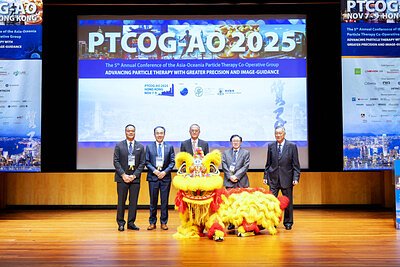
Hong Kong’s New Proton Therapy Center Aims to be Regional Cancer Care Hub
With the first proton therapy system in the Greater Bay Area, Hong Kong’s HKSH Medical Group is positioning itself as a leader in advanced cancer treatment and attracting international patients.
Hong Kong’s New Proton Therapy Center Aims to be Regional Cancer Care Hub
Hong Kong, November 13, 2025 – Hong Kong Sanatorium & Hospital (HKSH), a leading private healthcare provider, is solidifying its position as a regional center of excellence in cancer care with the launch of its advanced proton therapy system – the first of its kind in the Greater Bay Area. Hosted last week, the 5th Annual Conference of the Asia-Oceania Particle Therapy Co-operative Group (PTCOG-AO) served as a platform to showcase this new capability and signal Hong Kong’s ambition to attract international patients seeking cutting-edge cancer treatments.
Proton therapy is an advanced form of radiation therapy that uses protons instead of X-rays to target tumors with pinpoint accuracy. This minimizes damage to surrounding healthy tissues, leading to fewer side effects and improved outcomes for many cancer patients. While available in select countries, access remains limited, particularly within the rapidly growing Greater Bay Area, a key economic and population center in Southern China.
“We are incredibly proud to bring this technology to Hong Kong and the Greater Bay Area,” stated Dr. Walton Li, CEO of HKSH Medical Group. “Our commitment is to provide the highest quality care to our patients, and proton therapy is a game-changer in the fight against cancer.”
Rising Demand for Advanced Cancer Treatment in Asia
The launch of HKSH’s proton therapy center comes as cancer rates continue to rise globally, particularly in Asia. According to the World Health Organization, Asia accounts for over half of all new cancer cases and deaths worldwide. This surge in demand is driving significant investment in advanced cancer treatments, including proton therapy.
“There’s a clear need for more sophisticated cancer care options in this region,” explained one medical physicist attending the PTCOG-AO conference. “Many patients are traveling abroad for treatment, and having a world-class facility right here in Hong Kong is a huge step forward.”
Analysts predict that the Asia-Pacific proton therapy market will experience substantial growth in the coming years, fueled by rising disposable incomes, increasing awareness of advanced treatment options, and government initiatives to improve healthcare access. The market is expected to reach USD 117.55 million by 2028, with China dominating due to its aging population and increasing public awareness.
Hong Kong’s Competitive Edge
While other Asian countries, such as Japan, South Korea, and Singapore, already have established proton therapy centers, Hong Kong offers several unique advantages. The city boasts a robust healthcare system, internationally trained medical professionals, and a reputation for high-quality care. Furthermore, its strategic location and established financial infrastructure make it an attractive destination for medical tourism.
“Hong Kong has a long history of providing excellent medical care,” stated a radiation oncologist attending the conference. “Its infrastructure and skilled workforce give it a competitive edge in attracting patients from across the region and beyond.”
HKSH Medical Group is actively promoting Hong Kong as a destination for advanced cancer care, leveraging its relationships with international partners and participating in medical tourism initiatives. The recent PTCOG-AO conference, which attracted nearly 600 participants from 16 countries, served as a platform to showcase Hong Kong’s capabilities and attract potential patients.
Navigating a Competitive Landscape
Despite Hong Kong’s advantages, the competition in the Asia-Pacific proton therapy market is fierce. Established centers in Japan and South Korea are well-respected and have a strong track record of success. Additionally, new centers are emerging in countries like India and China, further intensifying the competition.
HKSH Medical Group is differentiating itself by focusing on personalized care, advanced technology, and a commitment to research. The group has invested heavily in state-of-the-art equipment and is actively collaborating with leading researchers to develop new and innovative cancer treatments.
“We’re not just offering proton therapy; we’re offering a comprehensive cancer care experience,” stated Dr. Simon Tang, Chairman of the PTCOG-AO 2025 Organizing Committee. “Our focus is on providing patients with the best possible outcomes, and we’re committed to pushing the boundaries of cancer research.”
Government Support and Future Prospects
The Hong Kong government is actively supporting the development of the city’s medical tourism industry, recognizing its potential to drive economic growth and improve healthcare access. InvestHK is working to attract foreign investment in the healthcare sector and is promoting Hong Kong as a destination for medical tourism.
“The government is committed to making Hong Kong a leading medical hub in the region,” stated a spokesperson for InvestHK. “We are working closely with private healthcare providers like HKSH Medical Group to attract international patients and promote Hong Kong’s expertise in advanced cancer care.”
The launch of HKSH’s proton therapy center is a significant milestone in Hong Kong’s efforts to become a regional center of excellence in cancer care. With continued investment in advanced technology, skilled healthcare professionals, and government support, Hong Kong is well-positioned to attract international patients and lead the way in the fight against cancer. The hospital is also exploring collaborations with other hospitals in the Greater Bay Area to offer integrated cancer care services, improving access for patients in the region. As one attendee put it, “This is an exciting time for cancer care in Hong Kong and the Greater Bay Area.”
